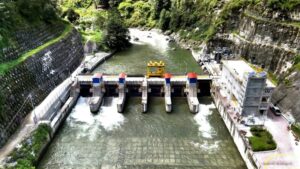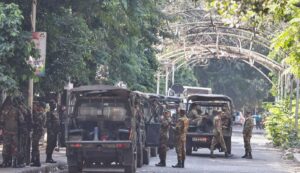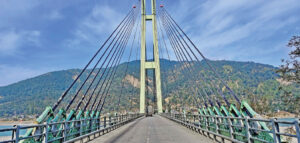
Road systems have presently associated the far-flung Karnali locale, giving trust to individuals, generally apple agriculturists, who can presently send their create to the markets and get sensible prices.Karnali is developing more apples, but questionable .
However, the poorly-constructed street systems have ended up a bane for the villagers. At whatever point the crops ended up market-ready, catastrophe strikes.
Rural streets are regularly a help for these communities, but they stay closed most of the time due to an increment in catastrophes, which specialists trait to climate change.
Now, a few apple producers are examining whether their harvests seem be sent to bordering Tibetan cities, as streets are as often as possible harmed amid the storm season at top gather time, stopping supplies to the Nepali market.
“It would be a awesome alleviation for apple producers in Humla if they may send out apples to the Chinese cities,” said Namgyal Tamang, previous president of Humla Chambers of Commerce and Industry.
The apple cultivate in Dolpa covers 412 hectares. In any case, the locale faces troubles in sending the natural product to the showcase. Ranchers complain that their apples regularly go to waste.
Last year, Dolpa created 3,696 tons of apples, but as it were 50 tons made it to the advertise, concurring to Ganesh Adhikari, chief of the Agribusiness Improvement Office, Dolpa.
“Roads are more often than not closed amid the apple gather, which is a enormous problem,” said Adhikari. “Many agriculturists store their apples utilizing conventional strategies. If the apples don’t rot, dealers take them to markets like Nepalgunj and Surkhet.”
Adhikari said apple generation has expanded this season, with yield coming to 4,000 tonnes.
In Simkot, the central command of Humla, apples have been planted on 518 hectares.
Last year, the locale delivered 4,224 tons of apples, but none come to the advertise. In spite of the fact that a street organize come to Simikot in Walk this year, transportation is totally slowed down in Humla clearing out ranchers incapable to offer their fruits.
“The street has come to Simikot, but it has been three months since no vehicles have been working. A few agriculturists utilize donkeys to transport apples, stressed that the natural product will decay,” said Dasharath Rokaya, an apple agriculturist in ward 7 of Simkot provincial region. “Shipping apples by discuss costs more than the natural product is worth,” he said.
Rokaya said that apples go to squander each year due to a need of streets. His plantation, which ranges 25 ropani (1.27 hectares), has 150 apple trees.
The fetched to transport a kilo of apple from Humla to Nepalgunj by discuss is Rs130. And from Humla to Surkhet, it costs Rs120 per kg.
Nimayangjum Lama of Bargaun in ward 3 of Simkot rustic region, has set up a capacity utilizing conventional strategies to keep apples for a month. “Nobody comes to purchase in bulk. In spite of the fact that I store the apples, half of them decay,” she said.
According to Lama, 25 enormous apple ranches are working in Simkot town. She said that apples are sent through flight as it were when the traveler takes them as gifts.
Currently, an apple gets up to Rs10.
High quality apples created in the upper comes to of Tilgufa district in Kalikot too go to waste.
“There is a bumper generation this year, but there is no street to transport them,” wailed over Dhan Bahadur Shahi, a nearby agriculturist of Chilkhaya in Kalikot. “The tall transport costs are another issue that agriculturists say do not cover the taken a toll of production.”
Last year, Shahi created 42 tons of apples, but this season, yield dropped to 30 tons as a hailstorm harmed the plants. His plantation has 500 apple trees.
Sending apples to the Tarai cities through the Karnali thruway utilizing watchmen costs Rs10 per kg.
In later a long time, agriculturists in Phoimahadev, Chilkhaya, Rachuli, Jubitha, Chappre, Odanku of Mahabai, Gela, Mugraha of Subhakalika, Sukatiya, and Bharta of Kalikot have been locked in in commercial cultivating of apples.
Although vehicles can reach the town from Nagma and Rachuli Bazar amid winter, streets are for the most part discouraged amid the blustery season, causing numerous issues for the ranchers, said Parek Bahadur Shahi, a rancher from Jubetha.
“Traders with their vehicles can reach farmers’ plantations in Jumla. If the street might work round-the-year, all the apples may reach the market,” Parek said. “It is troublesome for us to take our deliver to the advertise, and on beat of that, we don’t get reasonable costs for our products.”
He said the village’s need of cold capacity, bundling, and reviewing offices strengths agriculturists to collect apples some time recently they age. “Apples are sold for Rs45 per kg in the village.”
Last year, 5,860 tons of apples were delivered over 605 hectares in Kalikot.
According to insights from the Karnali province’s Service of Arrive Administration, Farming and Cooperatives, apple is being developed on 3,419 hectares over all locale of the area but Surkhet.
Last year, Karnali created 31,000 tons of apples, and the generation is anticipated to be around the same this year, said Dhan Bahadur Kathayet, representative of the Arrive Administration Service. He said capacity issues, need of reviewing, street get to, and bundling contribute to the moo advertise esteem of Karnali apples.
Farmers are right now offering apples for Rs50 per kg. In Surkhet, a kilo of apples costs Rs125, whereas in Kathmandu, it comes to Rs250, Kathayat said. “With the need of well-managed promoting, ranchers are getting less esteem for their item, whereas buyers are compelled to pay tall costs. As it were dealers and go betweens benefit.”
Trucks carrying nourishment and development materials from Surkhet and Nepalgunj are returning with apples from Jumla, Mugu, and Kalikot.
Among other areas in Karnali, Jumla produces 12,500 tons of apples on 3,100 hectares.
While Jumla has long been eminent for its apples, the drift of commercial cultivating has been developing in later a long time in the district.
Min Bahadur Bhandari from ward 5 of Guthichaur rustic district in Jumla has contributed Rs220 million in his apple cultivate, which has 48,000 plants. The plantation delivered 80 tons of apples final year. He said dealers are going by his cultivate to purchase apples.
Bhandari points to create 200 tons of apples this season.
Tanka Giri of ward 3 of Guthichaur has planted 14,000 apple trees on 22 hectares with an speculation of Rs70 million. It has been two a long time since he begun apple cultivation.
“There was no street in the past. When we couldn’t take those apples to the showcase, they were frequently nourished to animals,” Giri said. “But presently the request for Jumla apples has come to worldwide markets, and this has empowered us to invest.”
“Roads have been discouraged regularly for years,” said Karna Bahadur Budhathoki, a dealer from Jumla. “A single day of end in the transportation can ruin apples worth hundreds and thousands of rupees.”
Budhathoki said that around 3 tons of apples that he obtained were ruined. Right now, he is buying apples from agriculturists at Rs50 per kg. It costs an extra Rs20 per kg, which incorporates the fetched of bundling the apples in cartons and transportation to Surkhet.
Related,
Elon Musk extends his domain of misinformation







